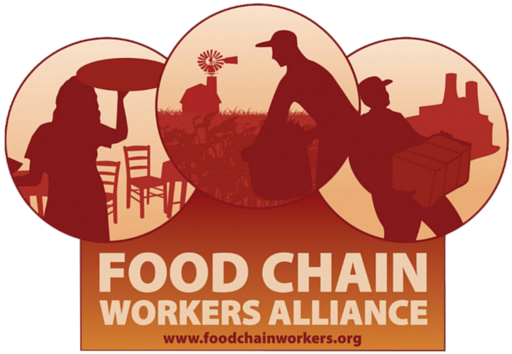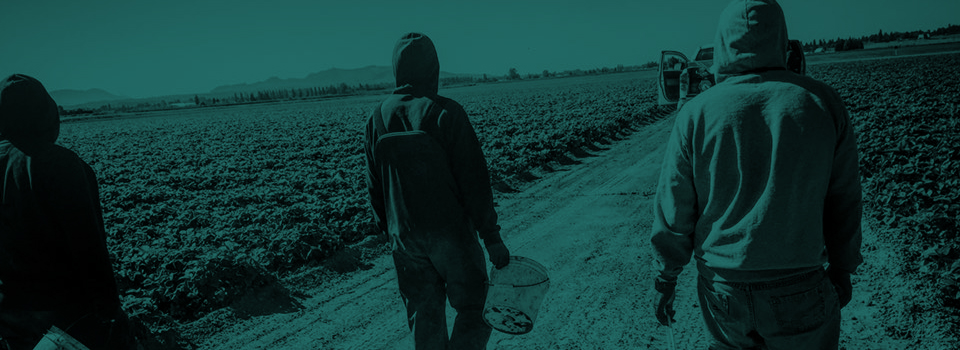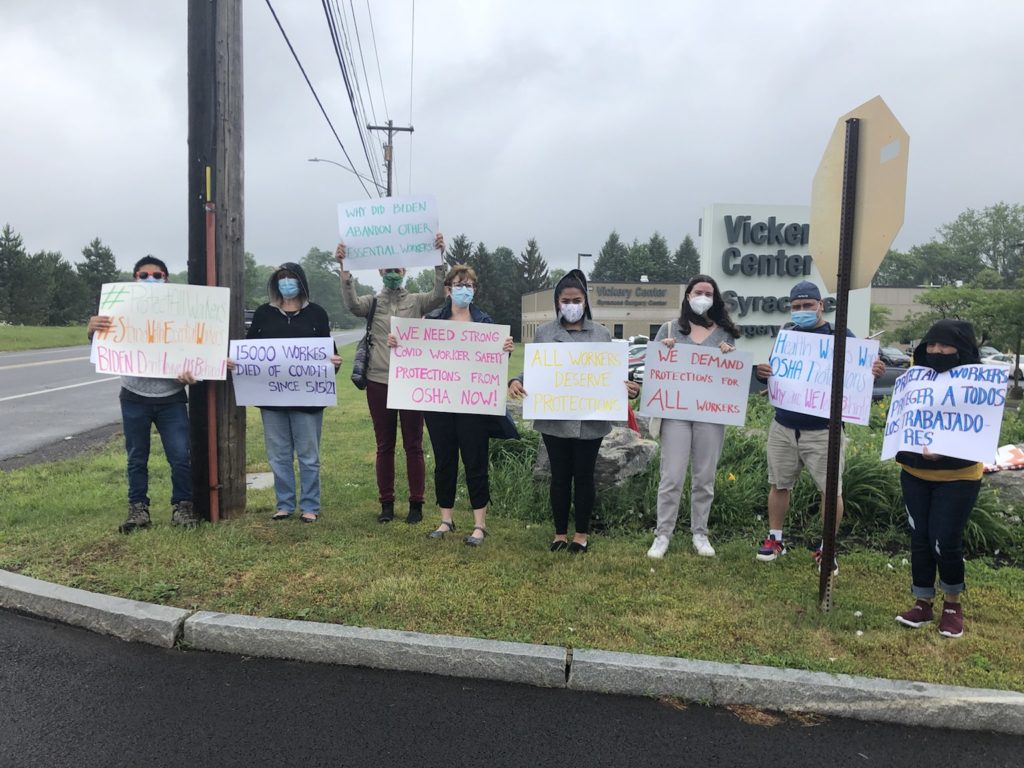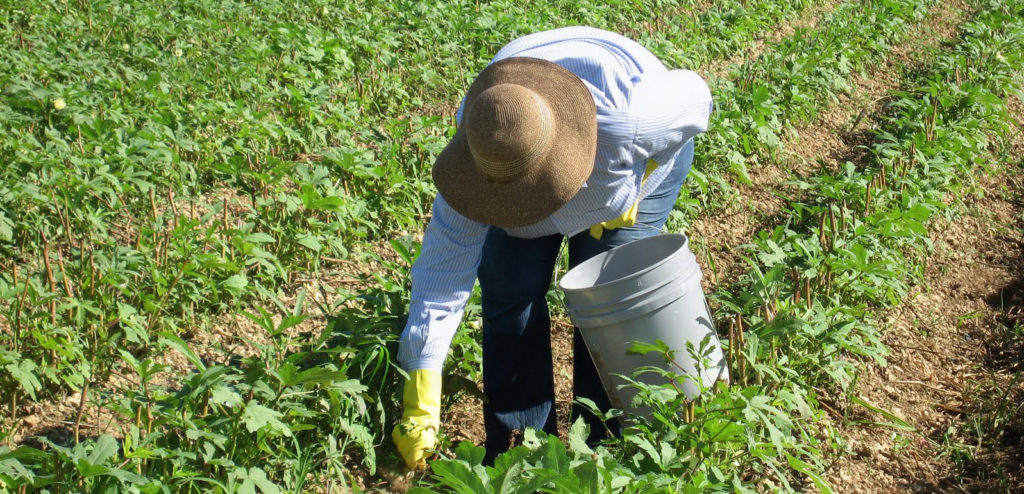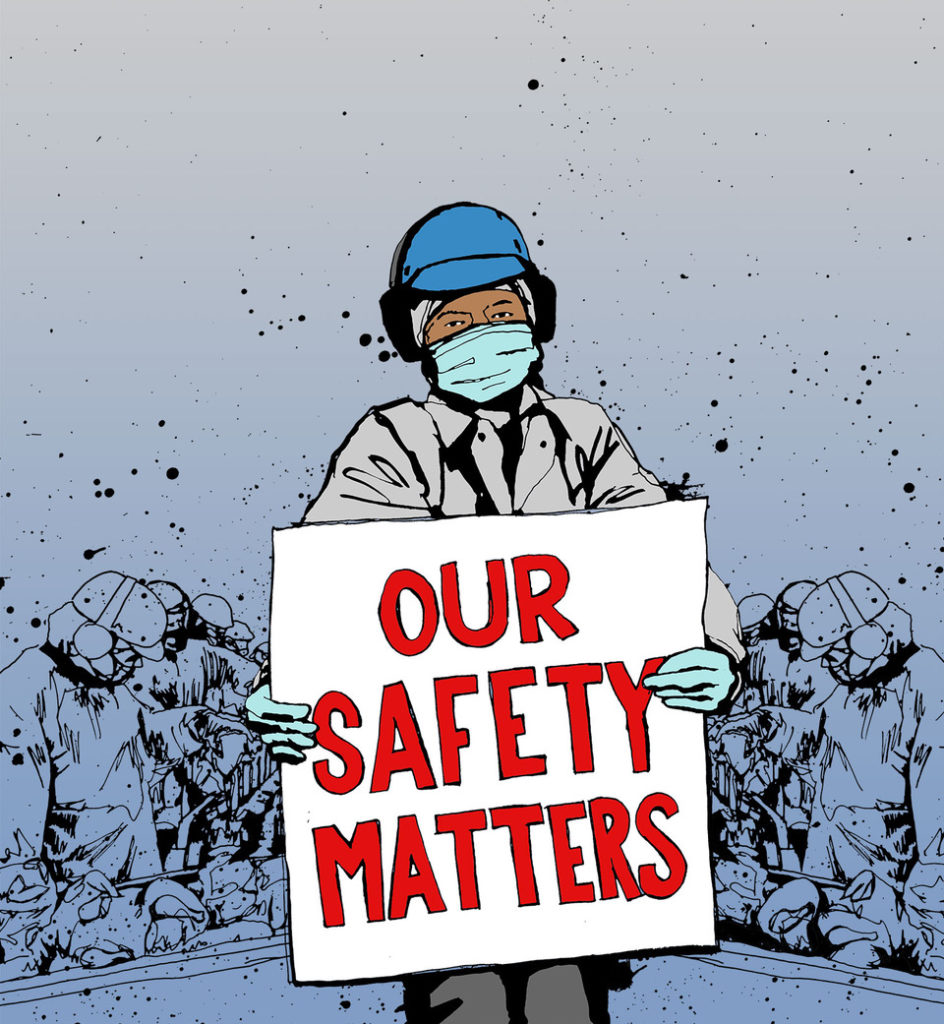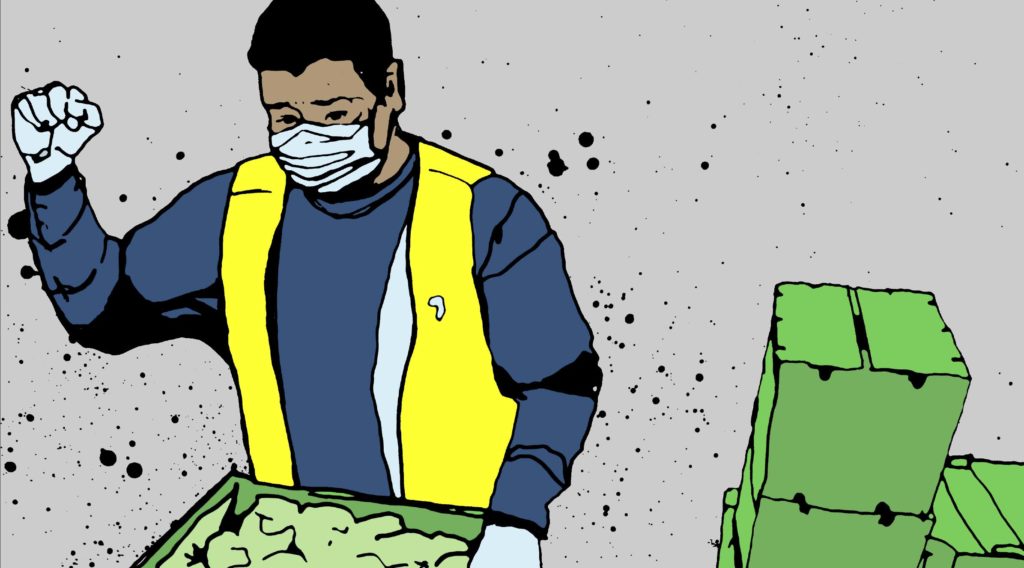This week, the U.S. Senate parliamentarian ruled against the inclusion of initial immigration reform measures in the federal budget reconciliation package. As legislators consider additional avenues for advancing immigration reform, the Food Chain Workers Alliance, farmworker members, and over 50 labor, food and other organizations released a letter urging President Biden, Secretary of Agriculture Tom Vilsack, and legislators to abandon the proposed Farm Workforce Modernization Act (FWMA) and its harmful measures such as mandatory E-Verify, and instead deliver meaningful and just pathways to citizenship for farmworkers and others..
Upon the release of the letter, advocates issued the following statements:
“Whether through the FWMA, the federal budget or any other vehicle, tying immigration status to immigration enforcement, mandatory E-Verify, and labor exploitation is unacceptable,” said Fabiola Ortiz Valdez, Food Chain Workers Alliance. “Farmworkers and essential workers who risked their lives to provide food for this country during the pandemic deserve an immediate and clear path to legalization.”
“We must develop a path to citizenship for farmworkers and the millions of other immigrant essential workers who are a huge part of our economy and food system. Immigration reform must be just to the people who have been working to feed us for decades. The FWMA’s proposed expansion of the H-2A program is anything but, as it worsens the conditions that make workers vulnerable to abuse,” said Nezahualcoyotl Xiuhtecutli, Farmworker Association of Florida.
“Immigrant farmworkers deserve much more than the FWMA. My first job in the U.S was harvesting blueberries in the spring of 2004, since then I have seen farmworkers give their best years to agriculture including my mother. She started as a farmworker in 1999 and then became a crew leader serving the industry until 2015. Like her, many farmworkers have done it all, from planting to harvesting, all four seasons of the year. Now, most of the workers I know are either too old to work in labor intensive agricultural jobs or have transitioned to other industries equally essential,” said Jose Eduardo, Lovelace Fellow with the American Friends Service Committee Pan Valley Institute. “We need meaningful and inclusive immigration policies that recognize the contributions, rights, and dignity of all farmworkers. AFSC calls on legislators to oppose the FWMA and instead put forward humane policies that protect the labor and human rights of farmworkers. Farmworker communities deserve the opportunity to obtain permanent immigration status and citizenship, along with equal access to all social programs and legal protections including the right to organize and exercise their labor rights.”
“As essential workers and grassroots farmworker movement leaders that work alongside family farmers, and in dangerous exploitative conditions in corporate agri-business, the value of our labor in the food system must be recognized. We are humans like everyone else, with families and a stake in our communities, this democracy, economy and culture. We need a fair chance towards legalization, not further exploitation. We will continue to persevere in building a healthy food system for all and commit to protect the air, land and water that feed our nation,” said Rosalinda Guillen, Community 2 Community
“At a time when employers are struggling to find workers, why would any place of employment endorse more restrictions to keep workers out? E-verify is a highly flawed database that keeps millions out of the workforce. It was designed to address immigration challenges but it has clearly failed in that quest. Meanwhile America’s economy is hungry for workers. Congress needs to scrap E-verify and ensure more workers can work legally and safely, without the fear of retaliation,” said Jessica E. Martinez, Co-executive director, National COSH
“Instead of the reactionary FWMA, Farmworkers deserve immediate and unconditional legalization. Farmworkers are on the frontlines of the pandemic, keeping our food system afloat. They have been deemed “essential,” but most of them dehumanized as “illegal.” Instead of the FWMA, Congress should ensure that all undocumented workers, including farmworkers have a just and immediate path to citizenship,” said Janeita Lentz co-chair Immigrants’ Rights Working Group of Democratic Socialists of America
Photo: Edgar Franks
September 22, 2021
Dear President Biden, Secretary of Agriculture Tom Vilsack, and members of the Senate Judiciary Committee,
We are a group of farmworker organizations, and food justice, labor, and immigrant rights groups from across the country. We urge you to oppose The Farm Workforce Modernization Act (FWMA) and ensure that it does not pass into law.
This bill, which was first introduced in 2019, creates a limited and complicated path to legal status for farmworkers, expands an already exploitative H-2A program without necessary oversight, and unfairly makes the E-Verify system mandatory for the entire agricultural industry.
FWMA would require farmworkers to devote up to eight years of back-breaking labor in agriculture—an industry with extremely low wages and high injury rates—before they can even qualify for citizenship.
To make an already lengthy and complicated path even worse, the bill expands the flawed H-2A program by extending the program into new industries and year-round work for the first time, and freezing the Adverse Effect Wage Rate (AEWR) which will lower wages for many farmworkers.
H-2A workers’ immigration status is tied to one employer and workers are isolated in rural farming locations with little access to support, making it much more challenging to speak out about exploitation. When H-2A workers do report violations, they often face retaliation. Despite this, many H-2A workers courageously come together to expose violations in their workplaces. By linking the H-2A program to immigration reform this harmful bill amounts to a major giveaway to the grower lobby at the expense of workers. Immigration pathways should not be used to allow for labor exploitation of immigrant workers.
Making E-Verify mandatory for the entire agricultural industry will hurt farmworkers and set a dangerous precedent. Mandatory E-verify will worsen the criminalization of immigrants in farmworker communities and will expose undocumented farmworkers to more immigration enforcement.
While farmworkers desperately need stronger protection, including the right to organize and access to legal status, this bill is not the answer. The proposed bill does nothing to address the root causes of labor exploitation that farmworkers face on a daily basis and would ultimately make conditions even more difficult for farm workers across the country.
It is not the time to revive legislation crafted under the Trump administration, giving huge concessions to the grower lobby by linking the H-2A program to immigration reform. Instead, farmworkers, who have sacrificed so much during COVID-19 to ensure our food security, and all essential workers need an immediate and just pathway to citizenship.
Our collective health depends on the safety and well-being of the people working tirelessly to feed our communities, and migrant and undocumented workers deserve the opportunity to obtain immigration status and citizenship, along with equal access to all social programs and legal protections including the right to organize.
Please listen to the voices of farmworker leaders who will be negatively impacted by this bill and make sure that FWMA does not pass into law.
Signed:
Agricultural Justice Project
Alianza Agrícola
ALMAS/Graton Day Labor Center
American Friends Service Committee
Border Agricultural Workers Project
California Institute for Rural Studies
CATA – The Farmworker Support Committee
Catholic Charities of Tompkins/Tioga
Cocina Compartida de Trabajadores Cooperativistas (CCTC)
Cincinnati Interfaith Worker Center
Communications Workers of America (CWA) Local 4319
Community to Community Development
Community Voices for Immigrant Rights
Democratic Socialists of America
Fair World Project
Familias Unidas por la Justicia
Farmworker Association of Florida
Farmworker Self-Help
Florida People’s Advocacy Center
Food Chain Workers Alliance
GLOBAL LABOR JUSTICE-INTERNATIONAL LABOR RIGHTS FORUM
HEAL (Health, Environment, Agriculture, Labor) Food Alliance
IATSE LOCAL 52/IRONWORKERS LOCAL 580
Iowa Citizens for Community Improvement
Justice for Migrant Families Western New York
Justicia for Migrant Workers
La Semilla Food Center
Las Vegas DSA (Las Vegas chapter of Democratic Socialists of America)
Laundry Workers Center
Migrant Justice / Justicia Migrante
Migrant Legal Aid
National Council for Occupational Safety and Health (National COSH)
National Family Farm Coalition
National Immigrants’ Rights Working Group of DSA
National Latino Farmers & Ranchers Trade Association
Partners for Dignity and Rights
Pioneer Valley Workers Center
Restaurant Opportunities Center of DC (ROC-DC)
Rural & Migrant Ministry Inc.
Rural Community Workers Alliance
San Francisco Living Wage Coalition
Street Vendor Project
Street Vendors Of Chicago (SVAC)
Trade Justice Alliance
Tri-Cities Immigrant Coalition
Venceremos
Vermonters for Justice in Palestine
Warehouse Workers for Justice
WeCount!
Worker Justice Center of NY
Workers Center of Central NY
***********************************************************
Estimado presidente Biden, Secretario de Agricultura Tom Vilsack y miembros del Comité Judicial del Senado:
Somos un grupo de organizaciones de trabajadores agrícolas y grupos de justicia alimentaria, laborales y de derechos de los inmigrantes de todo el país. Les pedimos que se opongan a la Ley de Modernización de la Fuerza Laboral Agrícola (FWMA) y se aseguren de que no se convierta en ley.
Este proyecto de ley, presentado por primera vez en 2019, crea un camino limitado y complicado hacia el estatus legal para los trabajadores agrícolas, expande un programa H-2A que explota a trabajadores sin la supervisión necesaria, e injustamente hace que el sistema E-Verify sea obligatorio para toda la industria agrícola.
FWMA requeriría que los trabajadores agrícolas dediquen hasta ocho años de trabajo agotador en la agricultura–una industria con salarios extremadamente bajos y altas tasas de lesiones– antes de que puedan calificar para la ciudadanía.
Para empeorar aún más un camino ya largo y complicado, el proyecto de ley amplía el programa H-2A defectuoso al extender el programa a nuevas industrias y al trabajo durante todo el año por primera vez, y congelar la Tasa de Salario de Efecto Adverso (AEWR), que reducirá los salarios para muchos trabajadores agrícolas.
El estatus migratorio de los trabajadores H-2A está vinculado a un empleador y los trabajadores están aislados en lugares agrícolas rurales con poco acceso a apoyo, lo que hace que sea mucho más difícil hablar sobre la explotación. Cuando los trabajadores H-2A reportan violaciones, a menudo enfrentan represalias. A pesar de esto, hemos visto a muchos trabajadores H-2A unirse valientemente para exponer violaciones en sus lugares de trabajo.
Al vincular el programa H-2A con la reforma migratoria, este proyecto de ley dañino representa un gran regalo para el lobby de los agricultores a expensas de los trabajadores. Las vías de inmigración no deberían utilizarse para permitir la explotación laboral de los trabajadores inmigrantes.
Hacer que E-Verify sea obligatorio para toda la industria agrícola perjudicará a los trabajadores agrícolas y creará un precedente peligroso. La verificación electrónica obligatoria empeorará la criminalización de los inmigrantes en las comunidades de trabajadores agrícolas y expondrá a los trabajadores agrícolas indocumentados a una mayor aplicación de la ley de inmigración.
Si bien los trabajadores agrícolas necesitan desesperadamente protecciones, incluyendo el derecho a organizarse y acceder a un estatus legal, este proyecto de ley no es la respuesta adecuada. El proyecto de ley propuesto no hace nada para abordar las causas fundamentales de la explotación laboral que los trabajadores agrícolas enfrentan a diario y, en última instancia, dificultará aún más las condiciones para los trabajadores agrícolas en todo el país.
Este no es el momento de revivir la legislación elaborada bajo la administración Trump, dando enormes concesiones al lobby de los productores y vinculando el programa H-2A con la reforma migratoria. En cambio, los trabajadores agrícolas, que han sacrificado tanto durante el COVID-19 para garantizar nuestra seguridad alimentaria, y todos los trabajadores esenciales necesitan un camino inmediato y justo hacia la ciudadanía.
Nuestra salud colectiva depende de la seguridad y el bienestar de las personas que trabajan incansablemente para alimentar a nuestras comunidades, y los trabajadores migrantes e indocumentados merecen la oportunidad de obtener el estatus migratorio y la ciudadanía, junto con el acceso equitativo a todos los programas sociales y protecciones legales, incluido el derecho a organizarse.
Escuchen las voces de los líderes de los trabajadores agrícolas que se verán afectados negativamente por este proyecto de ley y asegúrense de que FWMA no se convierta en ley.


